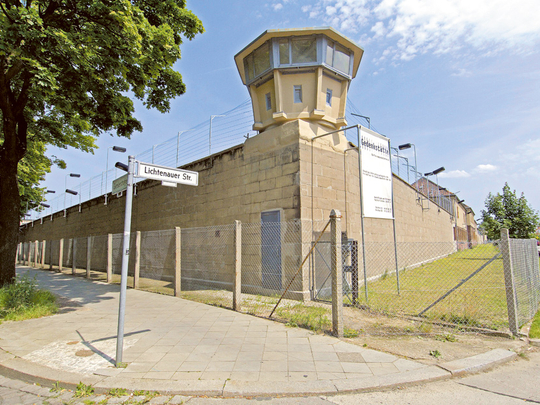
Berlin: Cliewe Juritza, is a guide at the former Stasi prison at Gedenkstatte in the suburb of Hohenschonhausen in East Berlin. It is not difficult to gauge he isn’t entirely comfortable with his job.
In the bigger scheme of things, he is a man who is relaying the events of the past to anyone who is interested in history — specifically the tumultuous history of Germany and the once-separated city of Berlin.
Juritza is a nervous man. Eyes constantly shifty. Speech delivered after long pauses as if the brain is carefully processing the information that he is about to share. It is highly probable that he still finds it difficult to trust. As if the Stasi were still hovering around him in the guise of tourists and visiting media.
He cannot be blamed, because Juritza is a victim of the ills and crimes that were committed in the name of Communism in the not so recent past.
“My grandmother faced a year in prison,” he stated matter-of-factly. “The charge read out to her was that she was considered to be a danger to the world. Have you ever had a grandmother who would be considered a danger to the world?” he asked. “Her crime — she was a Jehovah’s Witness”.
Imprisonment in the former East Germany wasn’t just restricted to his grandmother.
Juritza is one among a few guides who qualify for the job by virtue of the fact that they were imprisoned by the Stasi and this validates the stories they narrate.
“I was arrested in 1985,” Juriitza said. “I was only 18 years old. I tried to defect to the West and I failed. Later West Germany paid a ransom to set me free and get me across. The economy in East Germany was slowly sinking so they resorted to the scheme of selling prisoners to the West in return for a sum of money. My value was 96,000 Deutsch marks, which is equivalent to 70,000 euros (Dh320,193) today. This is what I was worth to the government of Eric Honecker. I was one among 34,000 prisoners sold to the West. The process of selling started in 1963 and ended in 1989.’
The former prison at Gedenkstatte is haunted by the crimes of the past. The air still reeks of cigarette smoke in the interrogation rooms where prisoners and suspects were subjected to a humiliating exercise in the display of power and relentless psychological pressure before they confessed to crimes they did not even commit.
“The GDR was one vast prison,’ endorsed Juritza. ‘And then there were prisons within prisons in this complex,” he said while detailing how the secret police operated at the height of their powers. “For instance, some cells were designed to block daylight. Prisoners had to be kept in the dark. They called it ‘The Submarine’. Some cells were hot while others were bitterly cold. An individual could receive as many as 19 sentences for crimes they mostly did not commit. Suspects ranged from professors, students and Jehovah’s Witnesses. A crime could range from passing on a book bought from West Germany, or offering opposing thought.
So bad were the conditions that prisoners constantly had to be put under suicide watch. “Even suicide was a crime since a failed attempt could trigger off negative reviews in the western press,” revealed Juritza.
“Cells were tiny and the maximum size of a bed was 1.68 metres. Between two beds there was one bucket which was emptied every morning containing excrement and urine of the day. One sheet of toilet paper — which was mostly newsprint paper — was divided between two people. Prisoners were forbidden to look at other prisoners. There were special sleeping rules — they had to sleep constantly on their backs with their hands over the blankets. If they changed position a guard would sound the alarm and shout and scream at them to go back to the designated sleeping position. Once a week, a suspect was led to the roof for half an hour to see daylight, followed by a shower and a change of underwear.’
As many as 250,000 political prisoners have had their lives turned upside down by the Stasi, an extension of the Ministry of State Security in the former East Germany. They were one of the most ruthless secret police agency ever to have operated. It was believed they were everywhere given the vast numbers of official recruits and paid informants. At the height of its power Hitler’s Gestapo unit numbered around 7,000, the Stasi had 91,000 members.
Reunification has tried to ensure that the wounds of the past would slowly heal. Justice has been served in a few cases, but delayed in others. Juritza stays connected with the past, probably much against his wishes. He would much rather forgive and forget. But he cannot. He has a duty: a story to tell. A cautionary tale for the benefit of mankind. That, by itself, is a selfless act.
Has he received his fair due? “The West paid a ransom for me,” he offered.
Juritza is still not free, unlike the former Director of Gedenkstatte Prisons who lives roughly 2km from his office. “He can be met by the neighbours at the local Chinese restaurant,” said Juritza showing a picture of the man.












